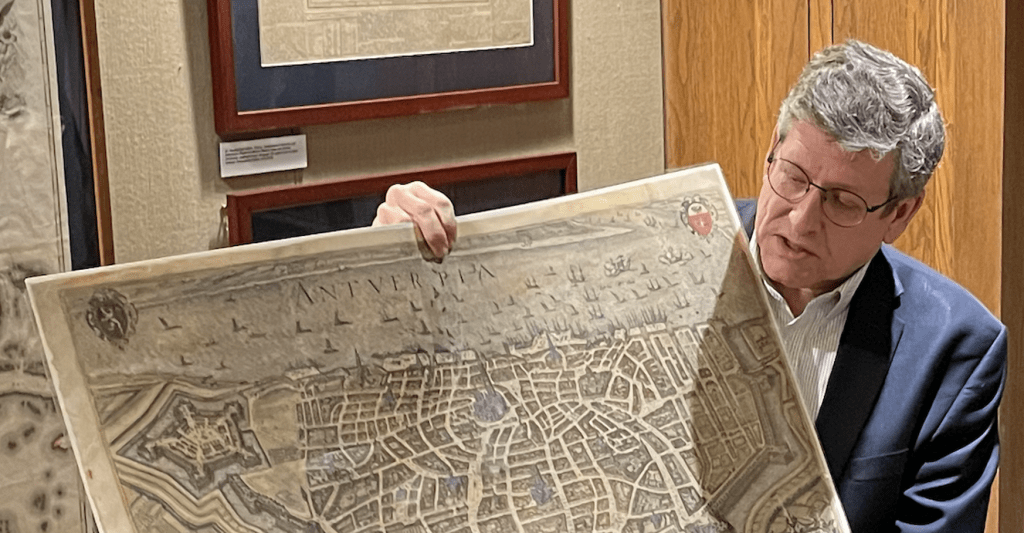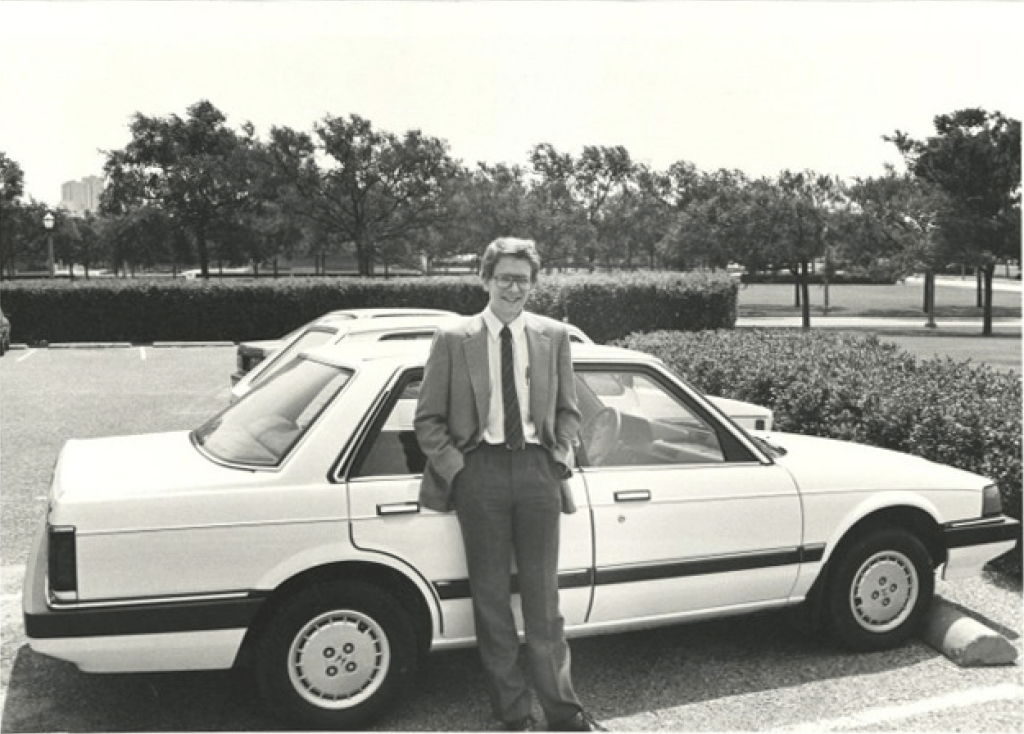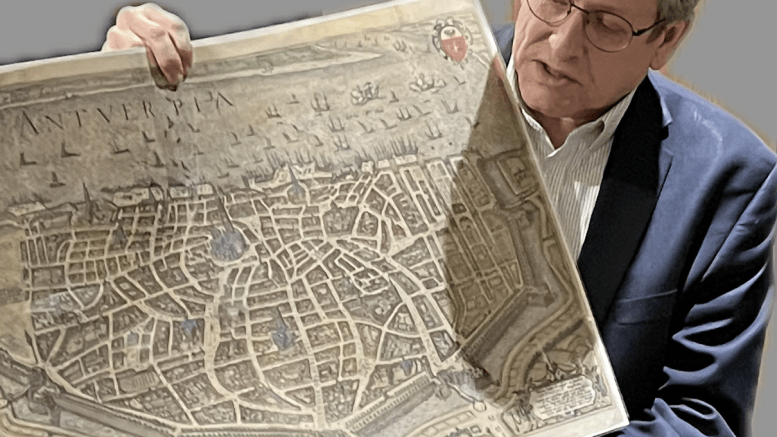Summary
On the occasion of his retirement from UT Arlington Special Collections in December of 2023, this article surveys Ben Huseman's accomplishments as a cartographic archivist at UTA, the Amon Carter Museum, and SMU's DeGolyer Library Special Collections.

For nearly eighteen years, visitors to the Special Collections Department of the UT Arlington Library have had the pleasure of meeting Ben Huseman, a deeply knowledgeable and gregarious cartographic archivist. With his trademark sportscoat, button down shirts, and inimitable laughter, Ben has introduced countless students, faculty and researchers to the historical treasures held in Special Collections. Whether he is talking about the African maps of Sebastian Münster, a sixteenth-century German cartographer, or the work of Antonio García Cubas, Mexico’s greatest nineteenth-century geographer, Ben has given voice and life to the pieces of paper and parchment, and rare books, that have made UTA Special Collections a leading archive in the United States. As Ben retires, after thirty-seven years of research, writing, curating, and teaching, Fronteras looks back on his remarkable career.
Ben’s passion for history began at an early age. Although he was born in Longview, Texas, Ben moved to the Meadowbrook neighborhood of Fort Worth with his parents when he was seven years old. Ben’s father was a patent and technical illustrator with a lifelong passion for history, a love that he inculcated in his son. Indeed, in grade school Ben aspired to be a painter of historical subjects. When he was in the fifth grade, the Fort Worth Press published a profile of Ben titled “Principal Gives Artist Commission,” explaining how Gene Morgan, the principal of Meadowbrook Elementary School, commissioned a painting of the U.S.S. El Dorado, the ship that Morgan had served on in the Pacific during WWII, from the young artist. The article noted that “regular scenics aren’t interesting to Ben, who says he thinks history is his best subject.” Indeed, Ben’s love and reverence for history grew out of his conviction that history was intimately related to the present. Through his grandmother, for example, he heard the Civil War stories that her grandfather had told her. Everywhere he went, Ben sought out older people and asked them about their memories and experiences. History was just one conversation away, rather than only being locked in the pages of a book.
One remarkable chapter in Ben’s professional career began the summer he started taking classes at TCU and working as a paste-up artist in the publications department, where he met Dr. Malcolm McLean, a professor of Spanish and History. The respected scholar and professor, who was also the great great grandson of Sterling C. Robertson, one of the most important empresarios to bring colonists to Texas in the 1830s, observed Ben’s interest for what became the first of the nineteen volume Papers Concerning Robertson’s Colony in Texas (1974). In fact, Dr. McLean was so impressed with Ben and his work that he and his wife Margaret soon funded a scholarship to help him finance his studies at TCU.
In 1992, Ben received his M.A. in American Civilization from UT Austin, then got a secondary teaching certificate and taught seventh-grade Texas history for a year, after which he began a five-year stint as Assistant Curator for Research at the Amon Carter Museum of American Art, where he had previously worked for nearly ten years as a Research Assistant and Curatorial Assistant. At the Amon Carter, Ben brought his passion for research, languages, and writing to his collaborations with Ron Tyler, a prolific scholar and director of both the Texas State Historical Association and the Amon Carter, and who in the early 1980s was assistant director for collections and programs at the museum. Dr. Tyler told Fronteras that Ben’s “knowledge of German language and culture was of great assistance in preparing a 1986 exhibition on lithography in Texas, research that he presented in his essay on lithography in Texas in the book Prints and Printmakers of Texas.” About this and other exhibitions and book projects undertaken at the Amon Carter, Tyler praised Ben for writing “well-researched, authoritative, and accessible essays.”

Ben Huseman and his “new” used car, Amon Carter Museum parking lot, Kimbell Art Museum in the background, 1986. Photo by Dan Barstow.
Ben has fond memories of all the projects he was a part of at the Amon Carter Museum –there are too many to detail here– but one of the most important was the work that went into his single-authored book titled Wild River, Timeless Canyons: Bolduin Mollhausen’s Watercolors of the Colorado, published in 1995 by University of Arizona Press and the Amon Carter. Mollhausen was arguably Germany’s most important nineteenth-century chronicler of the American West and when the Amon Carter purchased a portfolio of his watercolors long thought to have been lost, Ben rigorously researched them and produced his major study. This book, like all of Ben’s work, crosses borders, languages, and hemispheres to promote a deeper understanding of U.S. geography and history.
Between 2002 and 2006, Ben worked at SMU’s DeGolyer Library Special Collections, where he curated three exhibits relating to the Louisiana Purchase and Colonial New Spain. UT Arlington Special Collections became the beneficiary of this unflagging enthusiasm and archival excellence beginning in 2006. He contributed to various digital initiatives at UTA, such as helping with the N.E.H.-funded project to digitize thousands of maps for the Portal of Texas History and providing content for the Center for Southwestern Studies website A Continent Divided. Ben worked continuously on gallery guides for numerous exhibits tied to the Virginia Garrett Lecture series (2006-2022), building a rich and ample body of rigorous research about maps and other historical documents. He taught courses for the UTA Department of History and mentored students who have visited or worked in Special Collections over the years.

Ben Huseman teaching a group of students about UT Arlington’s Special Collections, April 2023.
One of the most remarkable and impactful chapters in Ben Huseman’s career at UT Arlington was his partnership with Dr. Jack Franke, registrar and Professor at the world-renowned Defense Language Institute in Monterey, California, as well as the Dean of its Multi-Language School. Dr. Franke, a UT Arlington alumnus, is the recipient of several prestigious research and teaching awards, including the US Army Commander’s Award for Civilian Service, and the UT Arlington College of Liberal Arts Distinguished Alumnus Award. When Dr. Franke told Ben in 2018 that he was interested in donating maps of Texas to Special Collections as a way of commemorating his appreciation for UT Arlington, and to honor his mentor Dr. Charles McDowell, Ben gently discouraged him because of the strength of library’s existing collection of Texas maps. Instead, Ben encouraged Dr. Franke to consider donating maps of Africa. Dr. Franke agreed and threw himself into researching and acquiring the maps of Africa that make up the collection named after him. Ben and Dr. Franke shared in the joys and occasional disappointments of the treasure hunt for maps of Africa. What happened over five short years was miraculous: Dr. Franke donated over seven hundred maps of Africa to Special Collections, making our campus the home of one of the most important collections of early African maps in the nation. Dr. Franke told Fronteras of his deep appreciation and abiding respect for Ben’s counsel and support: “He would guide me, he would steer me,” Dr. Franke said, “he was my guiding light.” Dr. Franke also praised Ben for being a maximizer who works miracles with very few resources. “It’s rare to have an archivist like Ben,” he said, “I’m so sad he’s leaving Special Collections.”
Ben has had a professional career filled with the wonder of discovery and the pleasure of sharing. His memories of UTA reach back half a century, to his playing bassoon as a part of the Fort Worth Youth Orchestra in Texas Hall in 1973. He told Fronteras that he cherishes the memory of meeting so many students, professors, donors, staff members, parents and library visitors from all around the Metroplex, Texas, and the world. “UTA’s diversity is truly delightful,” he said. As he gets ready to retire, Ben has a full plate of volunteer opportunities, travel, research, and family history projects to look forward to. For our part, as friends of Special Collections and the broader UTA Libraries, we celebrate Ben’s talent, generosity, and dedication to excellence. He left an indelible mark, in Special Collections, and in our hearts.
–For Fronteras by Christopher Conway

